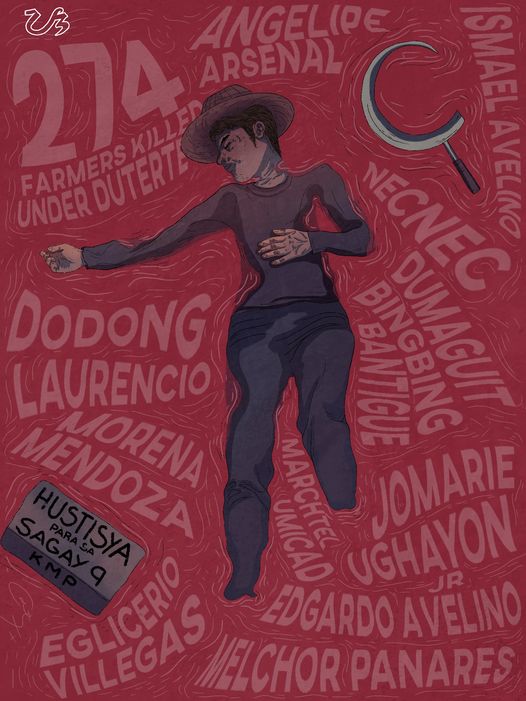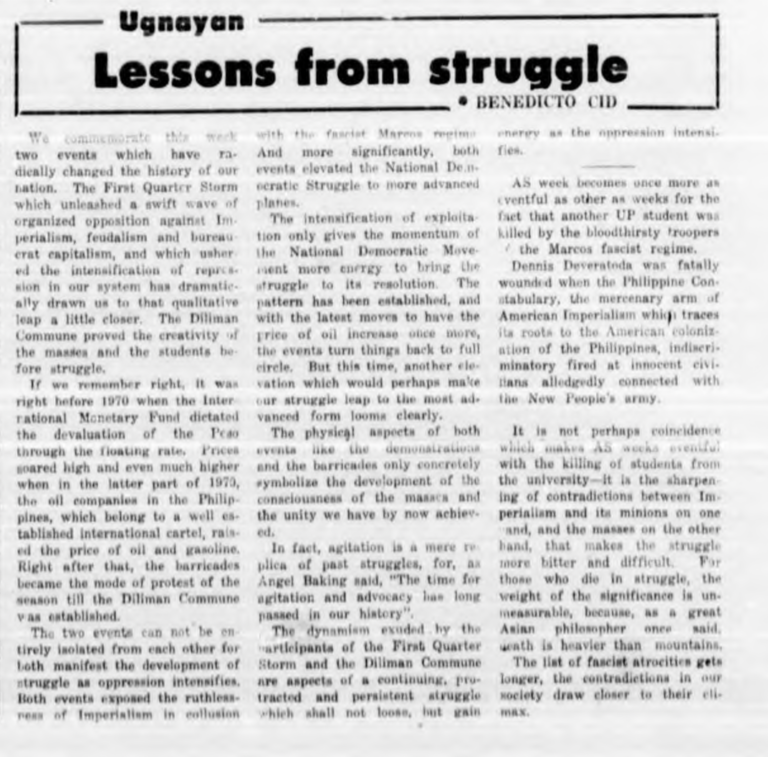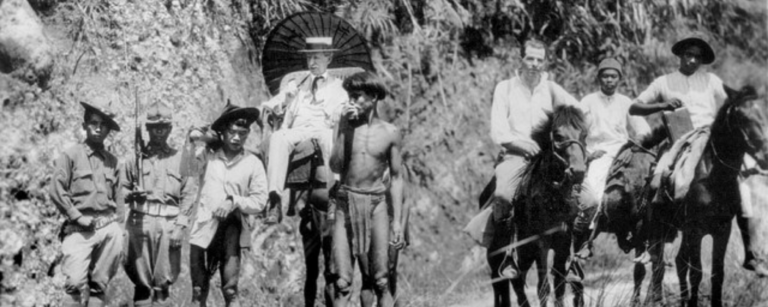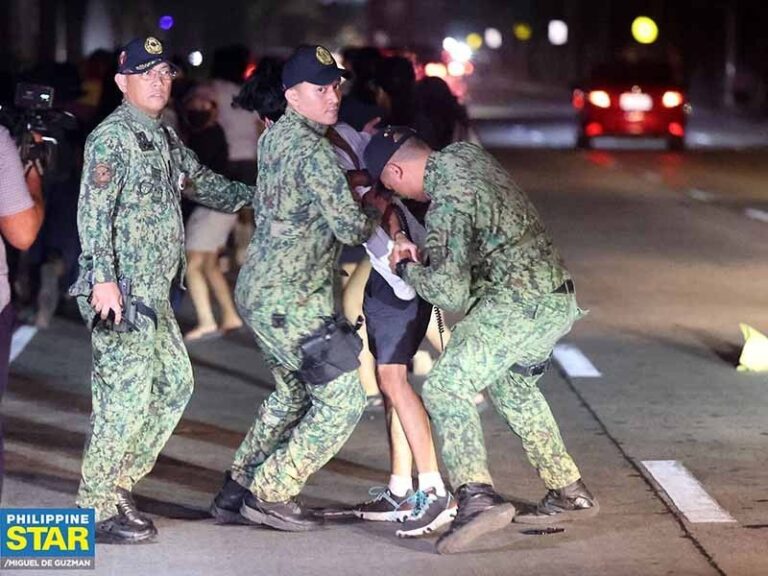
Nine farmers. Two years ago, nine farmers were killed in Hacienda Nene, Sagay City, Negros Occidental by suspected government forces for their struggle for land reform and redistribution.
They were killed for setting up a bungkalan on idle land in the hacienda to assert their rights and earn a meager sum to feed themselves during tiempo muerto when farm work is stopped. Since then, peasant massacres have mercilessly continued, leading to Negros Island being dubbed as the “Negros killing fields” due to the spike in killings in only a span of few months. An estimate of 100 peasants, farmworkers, religious people, lawyers, and activists have been killed for their alleged links to the communist movement. This proves how dangerous red-tagging can be.
A year ago, I remember attending a forum where farmers talked about their horrible experiences with militarization and land reform struggle. Some told how they were made to sign blank papers in exchange for some relief goods before being forced to confess as a “surrenderee” of the New People’s Army (NPA). Peasant women also reported sexual abuse and rape attempts by drunk soldiers who were camped in their villages. Strafing incidents were also common.
I found myself crying when I heard the story of Nanay Dehlia, a peasant leader of the Kilusang Magbubukid ng Pilipinas (KMP) in Guihulngan. On the basis that “Duterte kills anyone who rallies against him,” she was illegally detained for four days and four nights and asked to post a P45,000 bail. A few months after, state forces came to her house looking for her but she was not there. So, they killed her son point-blank. She was crying so much while she was talking.
Under four years of Duterte’s murderous regime alone, 277 peasants have already been killed. If not actual executions carried out by state forces, their paramilitaries and sponsored vigilantes have taken away the lives of farmers struggling for land reform. Their deaths tell the century-long exploitation of peasants under their feudal landlords, the violence of state terrorism, and the impossibility of a genuine agrarian reform law passed in a landlord-infested Congress.
For farmers, land means life. According to KMP, about seven out of ten farmers are landless. Meanwhile, thousands of hectares of large estates, haciendas, and plantations are owned by wealthy landed elites and foreign companies such as Del Monte and Dole. This lack of own agricultural land means poverty and serf bondage to their landlords. Past administrations have passed bogus land reform programs, such as the Comprehensive Agrarian Reform Program (CARP) and CARP Extensions with Reforms riddled with loopholes to avoid redistribution.
[READ: https://www.ibon.org/large-landholdings-amid-peasant…/]
Indigenous peoples (IPs) farmers also share this belief. In the countryside, where genuine development is barely felt by the masses, the State is forcing a development paradigm resisted by IPs for many years. Many Cordilleran tribes, Dumagat in Rizal-Quezon, Aeta in Central Luzon, and Lumad in Mindanao have been victims of development aggression. Land-grabbing by transnational companies, plantations, and huge construction firms, aided by state-funded military forces, have long threatened their peace and rights to their ancestral lands.
All of these narratives of injustice can be traced back to one of the roots of poverty in the country: feudalism. When farmers are forced to become modern slaves due to the concentration of vast lands at the hands of a few landlords and corporations, there is feudalism. Can you imagine that a hacienda the size of Manila and Makati combined is owned by the Cojuangco clan (Yes, the same Cojuangcos of Cory, Noynoy, and Kris!), but they make the farmers and farm workers get a P9.50 weekly wage and let them starve for weeks since work is not regular?
By examining this condition, one must ask who benefits from it? Can there be true development if the landlord owns much at the expense of millions of farmers? This obvious contradiction can best be understood in terms of class. The ownership of the mode of production by a few means the exploitation of many peasants. In this antagonistic relation, there will always be violence from both sides. But they differ as one preserves injustice while the other seeks true justice.
Hence, state terrorism will always be present as long as feudalism exists. State terrorism is utilized by the ruling class when their paid military fascists kill the toiling masses in order to preserve the status quo. In the eyes of the masses, the Armed Forces of the Philippines (AFP) and the Philippine National Police (PNP) will never abandon their mercenary traditions. The image of AFP and PNP will always be that of murderers, terrorists, and human rights violators.
But Duterte is a fool to think that murdering peasants and activists will hinder their struggles. It is the exact opposite. As long as social injustice persists — aggravated by feudalism — the legal peasant struggle and the peasant war in the countryside are also there to survive. This is revolutionary violence. One that seeks to question the very existence of the State-controlled by the ruling class and moves toward the liberation of peasants from feudalism. It is different from the violence employed by the ruling class; it is the power of the united ranks of the people.
Today, we have seen that state terrorism intensifies as Duterte is trying hard to use the archaic McCarthyite Red Scare to tag anyone as a communist, and by their reactionary logic, a terrorist. But the primary terrorist is in Malacañang for four years. Using state security as a pretext for the terroristic operations of the Terror Law, Duterte and his paid lapdogs, like Parlade and his anti-communist Task Force, are just exposing their state terrorism. Needless to say, the ruling class is willing to stifle dissent and criminalize opposition in order to protect their own interests.
For reasons we have laid out, it is not hard to understand why farmers join the armed struggle. As long as landlessness and other social problems remain, the armed struggle will not be resolved. Rather than red-tagging and state-sponsored massacres, the State must address the roots of the conflict. A slain NPA combatant and a son of farmer activists, Ka Arman Albarillo, explains that “It is the extreme poverty experienced by Filipinos, rampant corruption in the society, graft, [and] injustice that force farmers and workers to join the armed struggle. As we say, the government is the recruiter of the NPA because the masses have no other choice.”
(“Matinding kahirapan na dinaranas ng mga Pilipino, laganap na korapsyon sa lipunan, yung katiwalian, injustice, at yan ang nagtutulak sa mga magsasaka, sa mga manggagawa na mag-Hukbo. Kaya nga sabi namin, ang rekruter ng NPA ay mismong ang gobyerno dahil itinutulak sila ng sitwasyon.”)
Aside from the reality that many farmers join the inevitable armed struggle in the countryside, it would be a positive development if the peace talks between the government and the National Democratic Front of the Philippines continue. The draft Comprehensive Agreement on Socio-Economic Reforms (CASER) proposes a genuine land reform program and national industrialization will help many farmers and workers to improve their lives. By liberating the country’s wealth from the hands of the oligarchy, the people will also be liberated.
Another option is the passing of the Genuine Agrarian Reform Bill (GARB) filed by Anakpawis Partylist at least a decade ago. GARB is nothing like Aquino’s CARP and Akbayan’s CARPER. This law is the future for millions of landless farmers but the landlord-dominated Congress would not even give this a chance because signing on it will be the death of their privileges. Thus, this improbability must be a reason for farmers and their allies to mobilize in the streets.
Lastly, for a fascist regime that only allocated 1.7% of the 2021 National Budget for agriculture and agrarian reform, farmers have no other choice but to broaden the united front to oust the dictator. On October 21, farmers and other progressive sectors flooded the streets of Mendiola — a historic place where 13 farmers were killed in 1987 — with no other objective but to intensify the mass movement. For the majority of the population, ousting Duterte is a step towards justice.
All of their stories of injustice should enrage us over an unjust system that victimizes innocent farmers who are only seeking for their own land to till, reasonable wages and working conditions, a future where those who feed the nation can put food on their table, and serve the dictator in the Palace his guilty verdict and make him pay for his crimes against the people.
Meanwhile, for a middle-class student imprisoned by the individualizing remote university, the struggle for liberation by farmers must teach them that it is a collective struggle that sows the seeds of a more just, democratic, and better future where social practice and integration to the masses teach them what the neoliberal universities have sanitized and marginalized for years.
That farmers are not terrorists but the bourgeois State is.
#StopKillingFarmers







